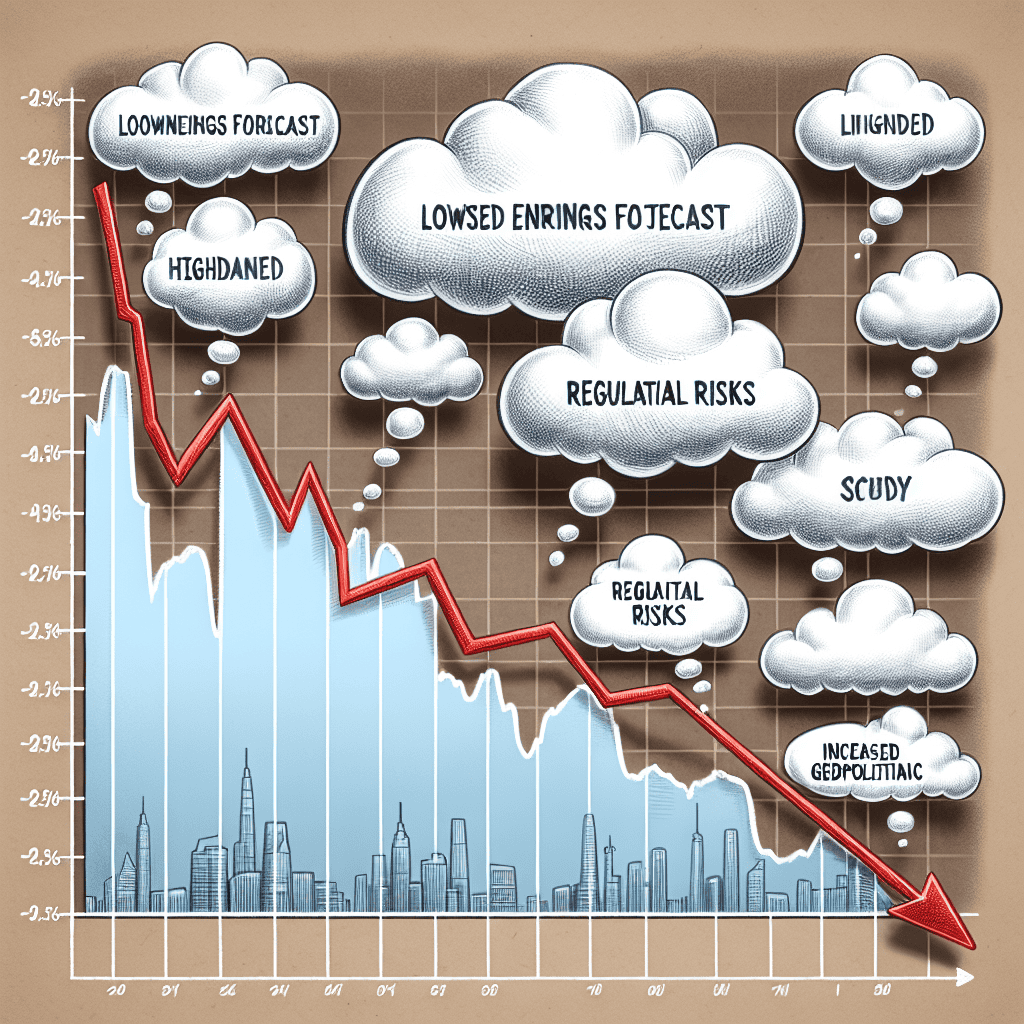“Chinese Tech Stocks Tumble: Earnings Woes and Trump Tensions Shake Markets”
Introduction
Chinese tech stocks have recently experienced a notable decline, driven by growing concerns over earnings performance and potential risks associated with former U.S. President Donald Trump’s policies. Investors are increasingly wary of the sector’s ability to sustain its rapid growth amid a challenging economic environment and regulatory pressures. The uncertainty surrounding U.S.-China relations, particularly in the technology domain, has further exacerbated market apprehensions. As companies navigate these complex dynamics, the volatility in Chinese tech stocks underscores the broader challenges facing the industry, highlighting the need for strategic adaptation and resilience in the face of geopolitical and economic headwinds.
Impact Of Earnings Concerns On Chinese Tech Stocks
The recent decline in Chinese tech stocks has been a focal point for investors and analysts alike, as concerns over earnings and geopolitical tensions have created a volatile environment. The performance of these stocks is often seen as a barometer for the broader health of the Chinese economy, and recent trends have sparked discussions about the underlying factors contributing to this downturn. One of the primary concerns affecting Chinese tech stocks is the uncertainty surrounding earnings. As companies navigate a complex global landscape, the pressure to meet or exceed earnings expectations has intensified. Many Chinese tech firms are grappling with slowing growth rates, which have been exacerbated by a combination of domestic regulatory pressures and international trade tensions. This has led to a cautious outlook among investors, who are wary of potential earnings misses that could further depress stock prices.
In addition to earnings concerns, the specter of geopolitical risks, particularly those related to former U.S. President Donald Trump, continues to loom large. During his tenure, Trump implemented a series of policies aimed at curbing China’s technological advancements, including tariffs and restrictions on Chinese tech companies. Although the current U.S. administration has taken a somewhat different approach, many of these policies remain in place, creating an environment of uncertainty for Chinese tech firms operating in the global market. The potential for renewed tensions or additional restrictions adds another layer of risk for investors, who must weigh these factors when considering their portfolios.
Moreover, the impact of these earnings concerns and geopolitical risks is not limited to individual companies but extends to the broader market. As Chinese tech stocks decline, there is a ripple effect that can influence investor sentiment and market dynamics. This can lead to increased volatility, as market participants react to both actual earnings reports and the anticipation of future developments. The interconnected nature of global markets means that fluctuations in Chinese tech stocks can have far-reaching implications, affecting not only domestic markets but also international investors with exposure to these companies.
Furthermore, the decline in Chinese tech stocks has prompted a reevaluation of investment strategies. Investors are increasingly looking for ways to mitigate risk while still capitalizing on potential growth opportunities. This has led to a diversification of portfolios, with some investors seeking exposure to other sectors or regions that may offer more stability or growth potential. At the same time, there is a growing interest in understanding the long-term prospects of Chinese tech companies, as many believe that the current challenges may ultimately lead to a more resilient and innovative industry.
In conclusion, the decline in Chinese tech stocks amid earnings concerns and Trump-related risks highlights the complex interplay of factors influencing the market. As investors navigate this challenging environment, they must consider both the immediate impacts and the long-term implications of these trends. While the current landscape presents significant challenges, it also offers opportunities for those who are able to adapt and respond to the evolving dynamics. As such, the future of Chinese tech stocks will likely be shaped by a combination of regulatory developments, geopolitical shifts, and the ability of companies to innovate and grow in an increasingly competitive global market.
Trump-Related Risks And Their Influence On Chinese Tech Markets
The recent decline in Chinese tech stocks has been a focal point for investors and analysts alike, as concerns over earnings and geopolitical tensions have created a volatile environment. A significant factor contributing to this downturn is the array of risks associated with former U.S. President Donald Trump’s policies and their lingering effects on the global market. These risks have not only influenced investor sentiment but have also raised questions about the future trajectory of Chinese technology companies.
To begin with, the legacy of Trump’s administration has left a lasting impact on U.S.-China relations, particularly in the technology sector. During his tenure, Trump implemented a series of tariffs and sanctions aimed at curbing China’s technological advancements and protecting American intellectual property. These measures included restrictions on Chinese tech giants such as Huawei and ZTE, which were accused of posing national security threats. Consequently, these actions have led to a heightened sense of uncertainty among investors, who are wary of potential retaliatory measures and further regulatory scrutiny.
Moreover, the Biden administration, while adopting a more diplomatic approach, has largely maintained a firm stance on China, particularly in areas concerning technology and trade. This continuity in policy has perpetuated the risks associated with U.S.-China tensions, as the two nations continue to vie for technological supremacy. As a result, Chinese tech companies are navigating a complex landscape where they must balance domestic growth ambitions with the challenges posed by international regulations and market access restrictions.
In addition to geopolitical factors, concerns over earnings have also played a crucial role in the decline of Chinese tech stocks. The global economic slowdown, exacerbated by the COVID-19 pandemic, has led to reduced consumer spending and disrupted supply chains, impacting the revenue streams of many tech firms. Furthermore, China’s domestic regulatory environment has become increasingly stringent, with the government implementing measures to curb monopolistic practices and ensure data security. These regulatory changes have introduced additional layers of complexity for tech companies, as they strive to comply with new standards while maintaining profitability.
Transitioning to the broader market implications, the decline in Chinese tech stocks has had a ripple effect on global markets, as investors reassess their portfolios in light of these risks. The interconnectedness of the global economy means that fluctuations in one region can have far-reaching consequences, influencing investor behavior and market dynamics worldwide. Consequently, the performance of Chinese tech stocks is closely monitored by market participants, who are keen to understand the potential implications for their investments.
In conclusion, the decline in Chinese tech stocks can be attributed to a confluence of factors, including Trump-related risks and concerns over earnings. The geopolitical tensions stemming from U.S.-China relations continue to cast a shadow over the technology sector, as companies navigate an increasingly complex regulatory environment. At the same time, economic challenges and domestic policy changes have compounded these issues, creating a challenging landscape for Chinese tech firms. As investors grapple with these uncertainties, the future of Chinese tech stocks remains a topic of significant interest and speculation, underscoring the need for careful analysis and strategic decision-making in an ever-evolving market.
Analyzing The Decline In Chinese Tech Stocks
The recent decline in Chinese tech stocks has captured the attention of investors and analysts worldwide, as concerns over earnings and geopolitical tensions have created a volatile environment for these companies. The downturn in stock prices can be attributed to a confluence of factors, each contributing to the uncertainty surrounding the future performance of these tech giants. As we delve into the reasons behind this decline, it is essential to consider both the internal and external pressures facing the sector.
To begin with, earnings concerns have played a significant role in the recent slump of Chinese tech stocks. Many of these companies have reported slower-than-expected growth, which has raised alarms among investors. The deceleration in growth can be attributed to several factors, including increased competition, regulatory challenges, and a maturing market. As the Chinese tech sector has expanded rapidly over the past decade, it has inevitably reached a point where sustaining the same level of growth becomes increasingly challenging. Consequently, investors are now recalibrating their expectations, leading to a reevaluation of stock valuations.
Moreover, regulatory scrutiny has intensified in recent years, further exacerbating the challenges faced by Chinese tech companies. The Chinese government has implemented a series of regulations aimed at curbing monopolistic practices and ensuring data privacy, which have had a direct impact on the operations and profitability of these firms. While these measures are intended to create a more equitable and secure digital landscape, they have also introduced a layer of complexity and uncertainty that has weighed heavily on investor sentiment. As companies navigate this evolving regulatory environment, their ability to adapt and comply will be crucial in determining their future success.
In addition to domestic challenges, Chinese tech stocks are also grappling with external pressures, particularly those stemming from geopolitical tensions. The relationship between China and the United States has been fraught with challenges, and the tech sector has often found itself at the center of these disputes. The Trump administration’s policies, which included tariffs and restrictions on Chinese tech companies, have had lasting effects that continue to influence market dynamics. Although the current U.S. administration has taken a different approach, the lingering impact of these policies remains a source of concern for investors.
Furthermore, the global economic landscape has been marked by uncertainty, with factors such as inflation, supply chain disruptions, and fluctuating consumer demand adding to the challenges faced by tech companies worldwide. Chinese tech firms are not immune to these global trends, and their ability to navigate these headwinds will be critical in determining their long-term prospects. As these companies strive to maintain their competitive edge, they must also contend with the broader economic forces that shape the industry.
In conclusion, the decline in Chinese tech stocks can be attributed to a complex interplay of factors, including earnings concerns, regulatory challenges, and geopolitical tensions. As investors assess the risks and opportunities within this sector, it is essential to consider both the internal dynamics of these companies and the external pressures they face. While the road ahead may be fraught with challenges, the resilience and adaptability of Chinese tech firms will ultimately determine their ability to weather this storm and emerge stronger in the future. As the landscape continues to evolve, stakeholders must remain vigilant and informed to navigate the complexities of this dynamic market.
Investor Sentiment Towards Chinese Tech Amid Political Tensions

Investor sentiment towards Chinese tech stocks has been notably cautious in recent months, as a confluence of factors has contributed to a decline in their market performance. Among these factors, concerns over earnings and the lingering effects of policies from the Trump administration have played significant roles. As investors navigate this complex landscape, understanding the interplay between these elements is crucial for making informed decisions.
To begin with, earnings concerns have been at the forefront of investor considerations. Chinese tech giants, which have long been seen as engines of growth, are now facing a more challenging environment. Slowing economic growth in China, coupled with increased regulatory scrutiny, has raised questions about the sustainability of their impressive earnings trajectories. Companies such as Alibaba, Tencent, and Baidu have reported slower revenue growth, prompting analysts to reassess their future prospects. This has led to a recalibration of expectations, with investors becoming more cautious about the potential for continued high returns.
Moreover, the regulatory landscape in China has undergone significant changes, further impacting investor sentiment. The Chinese government has implemented a series of measures aimed at curbing the influence of major tech companies, addressing issues such as data privacy, antitrust concerns, and financial stability. These regulatory actions have created an environment of uncertainty, as companies must navigate new rules and adapt their business models accordingly. Consequently, investors are wary of the potential for further regulatory interventions that could impact profitability and growth.
In addition to domestic challenges, the legacy of policies from the Trump administration continues to cast a shadow over Chinese tech stocks. The trade tensions between the United States and China, which escalated during Trump’s presidency, have not fully dissipated. Although there have been efforts to stabilize relations under the Biden administration, the geopolitical landscape remains fraught with complexities. The imposition of tariffs and restrictions on Chinese tech companies, such as Huawei, has had lasting effects, contributing to a sense of unease among investors. The potential for further geopolitical tensions adds another layer of risk to investing in Chinese tech.
Furthermore, the global economic environment has also played a role in shaping investor sentiment. The COVID-19 pandemic has disrupted supply chains and altered consumer behavior, affecting tech companies worldwide. Chinese tech firms, despite their resilience, have not been immune to these challenges. The pandemic has accelerated digital transformation, but it has also introduced volatility and unpredictability into the market. As a result, investors are grappling with the dual pressures of adapting to a post-pandemic world while contending with the specific challenges facing Chinese tech.
In light of these factors, it is evident that investor sentiment towards Chinese tech stocks is influenced by a complex interplay of domestic and international dynamics. While the potential for growth remains, the path forward is fraught with uncertainties. Investors must weigh the risks associated with regulatory changes, geopolitical tensions, and evolving market conditions. As they do so, maintaining a balanced perspective and staying informed about developments in both China and the broader global context will be essential. Ultimately, navigating this landscape requires a nuanced understanding of the multifaceted challenges and opportunities that define the current investment climate for Chinese tech stocks.
Future Outlook For Chinese Tech Stocks Amid Current Challenges
The future outlook for Chinese tech stocks is currently clouded by a confluence of factors that have led to a decline in their market performance. Among these, concerns over earnings and the lingering effects of policies from the Trump administration play significant roles. As investors navigate this complex landscape, understanding the interplay of these elements is crucial for making informed decisions.
To begin with, earnings concerns have been at the forefront of investor apprehensions. Chinese tech companies, which have experienced rapid growth over the past decade, are now facing a more challenging environment. The global economic slowdown, exacerbated by the COVID-19 pandemic, has led to reduced consumer spending and disrupted supply chains. Consequently, these companies are grappling with lower revenue growth and increased operational costs. Investors, therefore, are wary of the potential for disappointing earnings reports, which could further depress stock prices.
Moreover, regulatory pressures within China have added another layer of complexity. The Chinese government has intensified its scrutiny of the tech sector, implementing stricter regulations aimed at curbing monopolistic practices and ensuring data security. While these measures are intended to foster a more competitive and secure market environment, they have also introduced uncertainty. Companies are now required to adapt to new compliance standards, which may impact their profitability in the short term. This regulatory landscape has made investors cautious, as they assess the long-term implications for the growth prospects of these firms.
In addition to domestic challenges, the legacy of policies from the Trump administration continues to cast a shadow over Chinese tech stocks. The trade tensions between the United States and China, which escalated during Trump’s presidency, have not fully dissipated. Tariffs and export restrictions imposed on Chinese technology products remain in place, affecting the global supply chain and limiting market access for Chinese firms. Furthermore, the U.S. government’s blacklisting of certain Chinese tech companies has restricted their ability to procure essential components and technology from American suppliers. These geopolitical risks have heightened investor anxiety, as the potential for further escalation remains a possibility.
Despite these challenges, there are reasons for cautious optimism regarding the future of Chinese tech stocks. The Chinese government has demonstrated a commitment to supporting the tech sector as a key driver of economic growth. Initiatives such as the “Made in China 2025” plan and investments in emerging technologies like artificial intelligence and 5G infrastructure signal a strategic focus on innovation. These efforts could bolster the long-term competitiveness of Chinese tech companies, providing a foundation for future growth.
Furthermore, the global demand for technology products and services remains robust, driven by digital transformation across industries. Chinese tech firms, with their expertise in areas such as e-commerce, fintech, and telecommunications, are well-positioned to capitalize on these trends. As the world continues to embrace digital solutions, the potential for Chinese tech companies to expand their market share and explore new opportunities is significant.
In conclusion, while Chinese tech stocks face a challenging environment marked by earnings concerns and Trump-related risks, the sector’s future outlook is not devoid of promise. Investors must weigh the immediate challenges against the long-term growth potential, considering both domestic regulatory developments and international geopolitical dynamics. By doing so, they can better navigate the complexities of the market and make informed investment decisions that align with their risk tolerance and strategic objectives.
Comparative Analysis Of Chinese And Global Tech Stock Performance
In recent months, Chinese tech stocks have experienced a notable decline, driven by a combination of earnings concerns and geopolitical risks, particularly those associated with former U.S. President Donald Trump. This downturn has sparked a comparative analysis of the performance of Chinese tech stocks relative to their global counterparts, revealing a complex interplay of factors influencing investor sentiment and market dynamics.
To begin with, the earnings concerns surrounding Chinese tech companies have been a significant factor contributing to their recent underperformance. Many of these companies, including giants like Alibaba and Tencent, have faced challenges in maintaining their growth trajectories amid a slowing domestic economy and increased regulatory scrutiny. The Chinese government’s tightening grip on the tech sector, aimed at curbing monopolistic practices and ensuring data security, has led to a more cautious approach by investors. Consequently, the uncertainty surrounding future earnings potential has weighed heavily on stock prices, causing a ripple effect across the sector.
In contrast, global tech stocks, particularly those in the United States, have shown resilience despite facing their own set of challenges. Companies like Apple, Microsoft, and Amazon have continued to post strong earnings, driven by robust demand for their products and services. The relative stability of the regulatory environment in the U.S., coupled with a more predictable economic outlook, has provided a supportive backdrop for these companies to thrive. As a result, global tech stocks have generally outperformed their Chinese counterparts, highlighting the divergent paths these markets have taken.
Moreover, the geopolitical risks associated with Donald Trump have further exacerbated the decline in Chinese tech stocks. During his presidency, Trump implemented a series of measures aimed at curbing China’s technological ambitions, including tariffs, export restrictions, and sanctions on key Chinese tech firms. Although Trump is no longer in office, the lingering effects of these policies continue to pose risks for Chinese tech companies. The potential for renewed tensions between the U.S. and China, particularly in the realm of technology, remains a significant concern for investors, adding another layer of complexity to the investment landscape.
Despite these challenges, it is important to recognize that the long-term growth potential of Chinese tech stocks remains intact. The Chinese government has made significant investments in technology and innovation, positioning the country as a global leader in areas such as artificial intelligence, 5G, and e-commerce. Furthermore, the sheer size of the Chinese market, with its vast consumer base and rapidly growing middle class, offers substantial opportunities for tech companies to expand and capture market share.
In conclusion, the recent decline in Chinese tech stocks, driven by earnings concerns and Trump-related risks, underscores the importance of a nuanced understanding of the factors influencing market performance. While global tech stocks have generally fared better in this environment, the long-term prospects for Chinese tech companies remain promising. Investors must carefully weigh the risks and opportunities presented by these markets, taking into account the evolving regulatory landscape and geopolitical dynamics. As the global tech sector continues to evolve, the comparative analysis of Chinese and global tech stock performance will remain a critical area of focus for market participants seeking to navigate this complex and rapidly changing landscape.
Strategies For Navigating The Volatility In Chinese Tech Stocks
Investors in Chinese tech stocks have recently faced a tumultuous landscape, marked by declining valuations and heightened volatility. This downturn can be attributed to a confluence of factors, including concerns over earnings performance and geopolitical tensions, particularly those related to former U.S. President Donald Trump’s policies. As these challenges persist, it becomes imperative for investors to adopt strategic approaches to navigate the volatility inherent in this sector.
To begin with, the earnings concerns that have plagued Chinese tech stocks are not unfounded. Many companies in this sector have reported slower growth rates, which can be attributed to a variety of factors such as increased regulatory scrutiny and a maturing domestic market. The Chinese government’s tightening grip on tech giants, through antitrust investigations and data privacy regulations, has created an environment of uncertainty. Consequently, investors are wary of the potential impact on future earnings, leading to a cautious approach in their investment strategies.
Moreover, the geopolitical landscape has further complicated the situation. The lingering effects of the trade war initiated during Trump’s presidency continue to cast a shadow over Chinese tech companies. Although the Biden administration has taken a more measured approach, many of the tariffs and restrictions remain in place, affecting the global supply chain and market access for these firms. This geopolitical risk is compounded by the ongoing technological rivalry between the United States and China, which has led to increased scrutiny of Chinese tech companies’ operations and their potential ties to the Chinese government.
In light of these challenges, investors must consider several strategies to mitigate risks and capitalize on potential opportunities. Diversification remains a cornerstone of any robust investment strategy. By spreading investments across a range of sectors and geographies, investors can reduce their exposure to the specific risks associated with Chinese tech stocks. This approach not only helps in managing volatility but also allows investors to benefit from growth in other areas of the global economy.
Additionally, investors should focus on companies with strong fundamentals and resilient business models. Firms that demonstrate consistent revenue growth, robust cash flow, and a clear path to profitability are better positioned to weather the current storm. Conducting thorough due diligence and staying informed about regulatory developments and market trends can provide valuable insights into which companies are likely to thrive despite the challenges.
Another strategy involves adopting a long-term perspective. While short-term volatility can be unsettling, the long-term growth potential of the Chinese tech sector remains significant. China’s commitment to technological innovation and digital transformation continues to drive advancements in areas such as artificial intelligence, e-commerce, and fintech. By maintaining a long-term investment horizon, investors can ride out the current volatility and potentially reap substantial rewards as the sector evolves.
Finally, staying informed and agile is crucial in navigating the ever-changing landscape of Chinese tech stocks. Regularly reviewing investment portfolios and being prepared to adjust strategies in response to new information or shifts in market conditions can help investors stay ahead of the curve. Engaging with financial advisors or leveraging technology-driven investment platforms can also provide valuable support in making informed decisions.
In conclusion, while the decline in Chinese tech stocks presents challenges, it also offers opportunities for discerning investors. By employing strategies such as diversification, focusing on strong fundamentals, adopting a long-term perspective, and staying informed, investors can effectively navigate the volatility and position themselves for success in this dynamic sector.
Q&A
1. **What caused the decline in Chinese tech stocks?**
Concerns over earnings performance and potential risks related to policies from the Trump administration.
2. **Which major Chinese tech companies were affected?**
Companies like Alibaba, Tencent, and Baidu experienced declines.
3. **How did earnings concerns impact these stocks?**
Investors were worried about slower growth and profitability, leading to sell-offs.
4. **What specific Trump-related risks affected these stocks?**
Potential U.S. sanctions, trade tensions, and restrictions on Chinese tech companies.
5. **How did the market react to these concerns?**
There was increased volatility and a notable drop in stock prices for Chinese tech firms.
6. **Were there any regulatory factors involved?**
Yes, both U.S. and Chinese regulatory pressures contributed to investor anxiety.
7. **What is the outlook for Chinese tech stocks amid these concerns?**
The outlook remains uncertain, with potential for recovery if tensions ease and earnings improve.
Conclusion
Chinese tech stocks have experienced a notable decline due to a combination of earnings concerns and risks associated with policies from the Trump administration. Investors are wary of the potential impact of regulatory scrutiny and geopolitical tensions on the financial performance of these companies. The uncertainty surrounding future earnings, coupled with the possibility of further restrictions or sanctions, has led to a decrease in investor confidence. This environment of heightened risk and volatility underscores the challenges faced by Chinese tech firms in navigating both domestic and international pressures, potentially affecting their growth prospects and market valuations.





